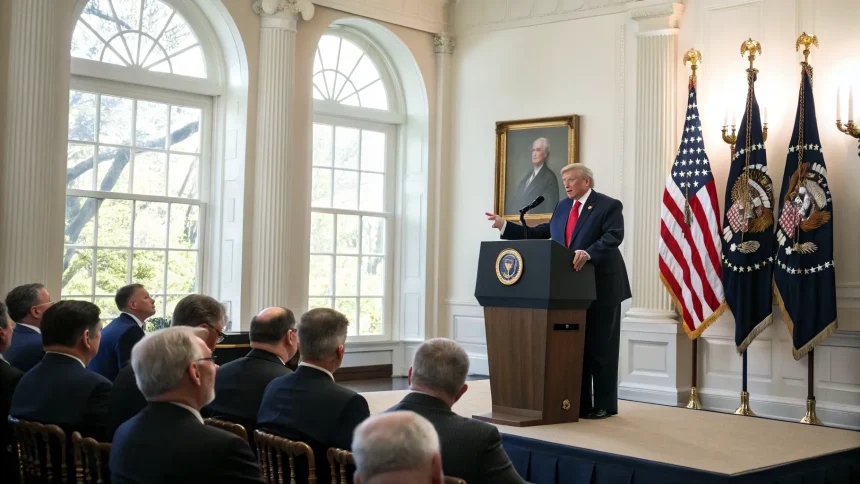US President Donald Trump announced a new initiative to reduce prescription drug prices by implementing restrictions on foreign pharmaceutical suppliers. The announcement came during a reception with Republican lawmakers, where the President outlined several policy priorities.
Trump positioned the drug pricing plan as a direct benefit to American consumers, stating his commitment to making medications more affordable. The strategy appears to focus on controlling imports rather than domestic price regulations, marking a shift in approach to pharmaceutical cost management.
Drug Pricing Strategy
The President’s plan targets foreign suppliers with import restrictions, suggesting a protectionist approach to pharmaceutical pricing. While specific details of the implementation remain unclear, the strategy indicates an attempt to address the disparity between drug prices in the United States and other countries.
Prescription drug costs have been a persistent concern for American consumers, with many medications costing significantly more in the US than in other developed nations. Trump’s approach suggests an attempt to level this playing field through trade policy rather than direct price controls.
‘One Big Beautiful Bill’
During the same reception, Trump promoted what he called his “One Big Beautiful Bill,” describing it as a historic piece of legislation with multiple objectives. According to the President, the bill encompasses:
- Tax reductions
- Federal spending cuts
- Border security measures
The comprehensive nature of the bill appears to combine fiscal policy with immigration enforcement, reflecting the administration’s attempt to address multiple Republican priorities in a single legislative package.
Energy Trade Agreement
Trump also highlighted a new liquefied natural gas (LNG) trade agreement with Japan, framing it as a significant economic achievement for his administration. The deal represents an expansion of US energy exports to Asia, potentially increasing American influence in global energy markets.
The LNG agreement comes as the United States has increased its natural gas production in recent years, transforming from a net importer to an exporter of natural gas. Japan, as one of the world’s largest LNG importers, represents a valuable market for American energy producers.
The President characterized the trade deal as a “major economic win,” suggesting it would create jobs and improve the US trade balance with Japan. Energy exports have become an increasingly important component of US trade strategy under the Trump administration.
The reception with Republican lawmakers served as a platform for Trump to outline these policy initiatives while reinforcing relationships with congressional allies. The focus on drug pricing, comprehensive legislation, and energy exports indicates the administration’s current priorities as it works with Republican lawmakers on its policy agenda.
As these initiatives move forward, questions remain about implementation details, congressional support, and potential industry responses, particularly from pharmaceutical companies that may be affected by new import restrictions.









